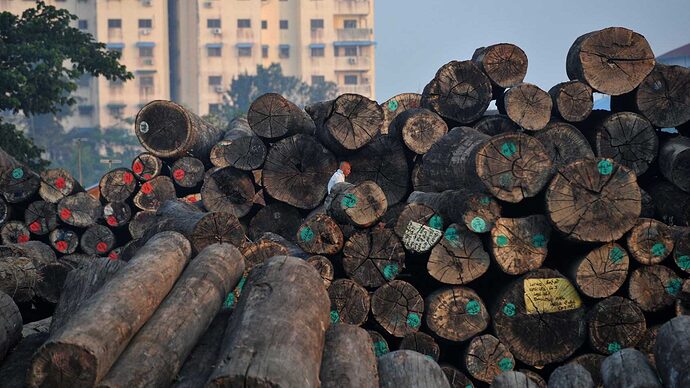A Myanmar man sits on a pile of wooden logs in Yangon.
The United States has become a destination for the proceeds of environmental crimes, undermining global moves to stem illicit financial flows and combat the climate crisis, according to a new report by a prominent anti-corruption advocacy group.
The report by the Financial Accountability and Corporate Transparency (FACT) Coalition, published on Oct. 26, said that “critical gaps” in the U.S. anti-money laundering system are vulnerable to exploitation by criminal groups, including those behind the destruction of the Amazon, the world’s largest tropical rainforest.
According to FACT, which represents more than 100 international transparency and conservation groups, the prevalence of abuse-prone shell companies and other secretive entities — which allow bad actors to anonymously stash dirty money in the U.S. and invest in real estate — are a key part of the problem.
“Financial secrecy makes the U.S., in some ways, the perfect playground for criminals looking to stash the illicit proceeds of environmental crimes,” FACT’s report said. The country “has a crucial role to play in denying financial safe haven to criminals that would degrade the Amazon,” the report said, which “poses a major climate risk for the world as a whole.”
Deforestation, and the subsequent loss of so-called “carbon sinks,” which absorb carbon dioxide from the atmosphere, is one of the major causes of climate change.
“Unless the U.S. implements comprehensive reforms, including the weaknesses that are described in the report, it will continue to provide an avenue for criminal actors wanting to abuse our financial system and launder environmental crimes proceeds,” said Ian Gary, the coalition’s executive director, at an event in Washington, D.C., to launch the report.
According to Interpol, illegal proceeds from environmental crimes, including illegal logging and mining, amount to $281 billion a year, and are often linked to corruption.
“Many of the people we interviewed highlighted the importance of anonymous shell companies in these environmental crimes,” Gary said. “They can be used to conceal payments to criminal organizations. They can be used as a getaway vehicle to launder the proceeds of environmental crimes. They can be used to evade civil accountability, and they can be used to facilitate [other] kinds of convergent crimes, such as corruption and tax evasion.”
The FACT report calls for the U.S. to implement its long-awaited database of company owners and to ensure foreign law enforcement is able to access the database when investigating environmental crimes. It also urges U.S. lawmakers to close loopholes that allow white-collar professionals who create and administer opaque financial structures to escape accountability.
FACT’s analysis focuses on forestry crimes and illegal mining in Peru and Colombia, and is partly based on interviews with law enforcement officials, conservationists and investigative journalists from the two South American countries and the U.S.
One case study in the report involves a Nevada company, Global Plywood and Lumber Trading LLC. In 2021, Global Plywood pleaded guilty to purchasing more than 1,000 cubic meters of wood ー 92% of the company’s imported wood ー that had been harvested illegally in the Peruvian Amazon. While under investigation by U.S. authorities, Global Plywood’s owners declared bankruptcy. The move allowed them to dissolve the company and dodge a likely court-ordered compliance plan, the report said.
Global Plywood was prosecuted by the U.S. Justice Department under the Lacey Act, which bans the trade of illegally harvested fish, wildlife, plants and plant products, such as timber and paper. But critics of the law argue it is often difficult to enforce because U.S. authorities must prove that a foreign law has been violated.
Julio Cusurichi, an indigenous leader of Peru’s Shipibo-Conibo community, said in a video clip shown at the launch event that his people have experienced the negative impacts of unregulated mining firsthand.
“The rivers are contaminated by mercury, which has poisoned the fish, which affects our daily diet. In turn, people in the community are found to have mercury in their hair and their blood,” said Cusurichi, who is president of the Federación Nativa del Río Madre de Dios y Afluentes . “It’s slowly killing our people, our fish and our rivers.”
